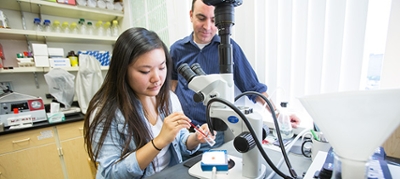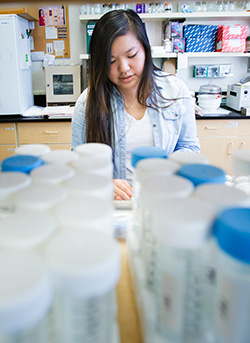When she came to Willamette four years ago, Serena Meng ’15 didn’t know what she wanted to do with her life.
Only after working as a lab researcher with biology professor Jason Duncan did Meng discover her purpose: She wants to change people’s lives for the better through science.
“I love genetics. I love biology,” she says. “I love breaking things down to understand the smallest parts that make us who we are.”
Making her Mark
Attracted to the university’s small size and diverse offerings, Meng enrolled at Willamette determined to make her mark. Her commitment to public service led her to join Pi Beta Phi Sorority, and her interest in medicine led her to work at Salem Hospital as a medical scribe.
But her ability to forge strong relationships with Willamette faculty members is what excited her the most.
“The professors are so friendly and approachable,” she says. “They are all invested in their students. From them, I learned how to use my resources well and to reach out when I need guidance.”
When Meng, a biology major, heard about an opening for a student researcher in Duncan’s lab during her junior year, she was intrigued. So she tracked him down one day to discuss the posting.
For the next hour, Duncan gave her a tour of his lab, showed her the fruit flies he studied and explained how his work has links to understanding such diseases as Parkinson’s and Alzheimer’s.
That’s when Meng knew Duncan would be her mentor.
“Jason cares about his students as individuals, and he teaches them methods outside the textbook,” she says. “He’s really inspirational.”
Puzzle Pieces
After Duncan hired her, Meng began studying the “slingshot” gene in Drosophila melanogaster, also commonly known as a fruit fly. The gene regulates actin — a protein that is required for cellular structure and function.
Meng aims to study the localization of actin in subcellular structures to see how they’re affected by disruption of slingshot. Already, she knows disruptions in actin regulation result in significant mutations in the fruit flies, but can also manifest into human diseases."
“It adds another piece to the puzzle,” she says about her and Duncan’s research. “I love seeing the results, seeing how complex organisms really are — and how complex life is.”
Impressed by Meng’s enthusiastic pursuit of knowledge, Duncan says she is a dedicated and committed researcher with an infectious work ethic.
“The pace at which she works is amazing,” he says. “Serena is on the way to becoming a successful, independent young scientist.”
Sharing Knowledge
Fascinated by genetics, Meng continued her work with Duncan through the Science Collaborative Research Program (SCRP), which enables select undergraduates to undertake a nine-week research project with natural science professors. Later, she presented her findings at a scientific conference in Vancouver, Washington, and during SCRP Recognition Day at Willamette.
The experiences cemented her desire to share her research with the scientific community. To that end, Meng is summarizing in her thesis the work she’s completed with Duncan.
“Students should leave their mark,” she says. “I want to leave mine by generating literature and communicating my research and its significance. I want to help people interested in science and scientific research.”
Now, in addition to completing her thesis, Meng is exploring the possibilities that await after graduation — namely medical school and graduate schools for medical research.
“Being able to do research in a lab is what turns a student into a scientist,” she says. “I really attribute my passion for biology and science to professor Duncan. He inspired me to be curious, to question things. I’m so grateful to him for that.”


